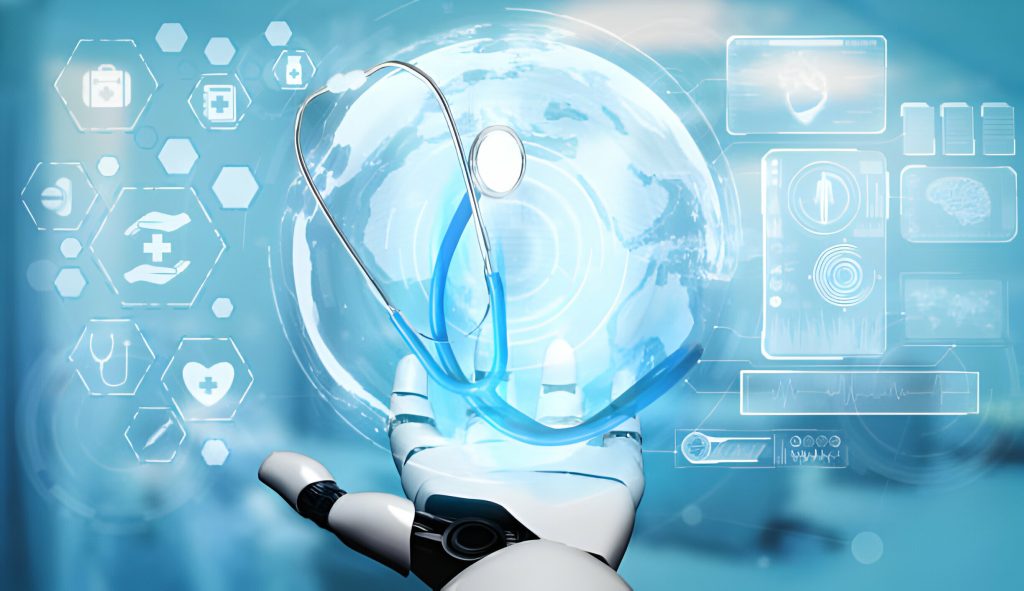Brace yourself, because AI is here to reshape the future of healthcare. With its advanced capabilities, AI offers a better understanding of health and disease, data-driven decision making, and even replaces traditional medical practices. Imagine personalized risk assessment, tailored treatment plans, and collaboration with engineering schools – all made possible by AI. But challenges lie ahead: biases in data sets and barriers for diverse populations. Nevertheless, the Keck School of Medicine is embracing this tool to tackle tough health challenges head-on. Get ready for an exciting journey into the world of medical AI!
The Power of AI in Medicine
AI promises to revolutionize medicine by providing a better understanding of health and disease, enabling data-driven decision making, replacing traditional medicine practices, and turning data into knowledge. With the power of AI, researchers are empowered to make informed decisions based on data. AI allows for personalized risk assessment, taking into account individual factors that contribute to health outcomes. Furthermore, AI helps uncover the molecular basis of diseases, shedding light on their underlying mechanisms and potential treatments. One of the key benefits of AI in medicine is its ability to eliminate barriers that hinder progress in healthcare. By leveraging AI technology, we can overcome limitations such as bias in current data sets and limited participation from diverse populations. Through the elimination of these barriers, AI has the potential to transform healthcare and improve outcomes for all individuals.
Advancements Enabled by AI
You can see the advancements enabled by incorporating AI in the field of healthcare. Personalized risk assessment and tailored treatment plans are now possible with the help of AI. Researchers and clinicians are empowered to utilize vast amounts of data, allowing them to focus on individualized care. Collaboration with engineering schools and communities has opened up new possibilities for innovation in healthcare. AI has also helped us understand the molecular basis of diseases, leading to potential breakthroughs and cures. Moreover, AI supports addressing bias and diversity in healthcare by considering social environmental support. These advancements have transformed the way we approach healthcare, providing more precise and effective treatments for patients. With continued progress in AI technology, we can expect even greater improvements in personalized medicine and patient outcomes.
Potential for Cures and Breakthroughs
The potential for cures and breakthroughs in healthcare is expanding as you gain a better understanding of the molecular basis for diseases. With AI breakthroughs, there is scientific support to uncover the intricate details of diseases at the molecular level. This knowledge opens up new avenues for developing targeted treatments that can address the root causes of various conditions. By delving into the molecular basis of diseases, researchers are able to identify specific genetic mutations or protein abnormalities that contribute to disease development. Armed with this understanding, they can develop innovative therapies that target these specific molecular markers, leading to more effective treatments and potential cures. AI plays a crucial role in this process by analyzing vast amounts of data and identifying patterns that may not be apparent to human researchers alone. Through AI-driven research, we can continue to make significant strides in finding new treatments and ultimately improving patient outcomes.
Addressing Bias and Diversity
In order to address bias and promote diversity in healthcare, you must make intentional efforts to eliminate barriers that prevent certain populations from participating in research. By eliminating bias and increasing representation, we can ensure fairness and address disparities that exist within the healthcare system. Overcoming barriers is crucial in order to gather accurate data that represents all individuals, regardless of race, ethnicity, gender, or socioeconomic status. It is important to recognize and actively work towards removing any obstacles that may hinder diverse populations from accessing healthcare services and participating in research studies. By doing so, we can create a more inclusive and equitable healthcare system that benefits everyone.
Introduction to Medical Artificial Intelligence
Get ready to explore the world of Medical Artificial Intelligence, where cutting-edge technology is transforming healthcare practices and revolutionizing patient care. In this exciting field, AI applications are using machine learning techniques and neural networks to uncover complex associations in data and inform clinical decision making. One of the key areas where AI is making a significant impact is personalized medicine. By analyzing individual patient history and nuances, AI can determine treatment plans tailored to each person’s needs.
Another important aspect of AI in medicine is its potential to address physician burnout. By automating repetitive tasks and reducing administrative burden, AI can free up more time for doctors to focus on patient care. With the exponential growth of medical data, AI also helps manage the cognitive load on physicians by assisting in making informed decisions.
Current Trends in Medical AI
Stay up to date with the current trends in Medical Artificial Intelligence by exploring how new technologies are integrating with current medical practices and improving efficiency in patient management.
- AI applications in diagnostics: AI is being used to analyze medical data and identify patterns that can assist in diagnosing diseases more accurately and quickly.
- AI in medical imaging: AI algorithms are aiding in the interpretation of medical images, such as X-rays and MRIs, helping doctors detect abnormalities and make more informed decisions.
- AI in drug discovery: AI is revolutionizing the process of discovering new drugs by analyzing vast amounts of data and identifying potential targets for treatment.
- AI in personalized medicine: With the help of AI, healthcare providers can tailor treatment plans based on individual patient characteristics, leading to more effective outcomes.
- AI in healthcare management: AI is streamlining administrative tasks, automating processes, and improving overall efficiency within healthcare institutions.
These advancements highlight the transformative impact that AI is having on various aspects of healthcare, ultimately improving patient care and outcomes.
AI’s Role in General Practice
As AI systems become better validated, they’ll be given more responsibility in determining individualized treatment plans. AI applications in primary care are already making a significant impact on patient management. AI-driven patient management systems can extract important information from a patient’s electronic footprint, saving time and improving efficiency. These systems can automatically prepare risks and actions based on a patient’s clinical record, further enhancing general practitioner capabilities. Additionally, AI can proactively suggest consultations and interventions based on a patient’s risk factors, contributing to preventative medicine. However, integrating AI into general practice comes with its own set of challenges. Building trust among patients and medical staff is crucial, as machines lack human qualities such as empathy and compassion. Furthermore, gaining regulatory approval and ensuring that AI complements rather than replaces human doctors are obstacles that need to be overcome for successful integration.
Challenges and Limitations of Medical AI
Machines in the field of medical AI face challenges such as integrating with current practices, gaining regulatory approval, and building trust among patients and medical staff. These challenges include:
- Regulatory challenges: Medical AI must navigate complex regulatory frameworks to ensure compliance with safety and efficacy standards.
- Ethical considerations: AI systems raise ethical questions around issues like informed consent, bias in algorithms, and decision-making accountability.
- Data privacy concerns: The use of sensitive patient data in AI algorithms raises concerns about privacy, security, and potential misuse.
- Clinical implementation issues: Integrating AI into clinical workflows requires overcoming technical barriers, training healthcare professionals, and ensuring seamless integration with existing systems.
- Patient trust: Building trust among patients and healthcare providers is crucial for successful adoption of medical AI, as it involves entrusting patient care to automated systems.
Addressing these challenges is essential for the widespread adoption of medical AI and realizing its full potential in improving healthcare outcomes.
Future Possibilities of Medical AI
Imagine the possibilities that lie ahead with the integration of medical AI, as it holds the potential to revolutionize healthcare and transform patient outcomes. The future of medical AI is promising, with personalized treatment plans becoming a reality. AI will play a proactive role in suggesting interventions based on individual patient risk factors, contributing to preventative medicine. Furthermore, AI-based systems will bring specialist expertise into primary care, enhancing the capabilities of general practitioners. Additionally, automation of administrative tasks will save clinicians considerable time by automating important risks and actions based on a patient’s clinical record. The evolving role of AI in patient management means that as AI systems become better validated, they will be given more responsibility in determining individualized treatment plans. With these advancements, medical AI has the potential to greatly improve healthcare delivery and patient outcomes.
Definition and Benefits of AI in Medicine
The definition of AI in the field of medicine involves IT systems that can mimic human brain functions, offering benefits such as automating tasks and reducing administrative burdens for physicians. With AI, you can experience the following benefits:
- Automation: AI can automate repetitive tasks, freeing up your time for patient care.
- Efficiency: By streamlining administrative tasks, AI helps improve efficiency in healthcare settings.
- Physician Burnout: AI can reduce the time spent on electronic health records and administrative tasks, alleviating burnout.
- Workload: With AI’s ability to manage and analyze large amounts of medical data, you can make informed decisions more efficiently.
- Improved Patient Care: By reducing paperwork and prior authorization burdens, AI allows you to focus more on providing high-quality care.
AI is poised to revolutionize medicine by enhancing automation, improving efficiency, addressing physician burnout, lightening workload burdens, and ultimately enabling better patient care.



